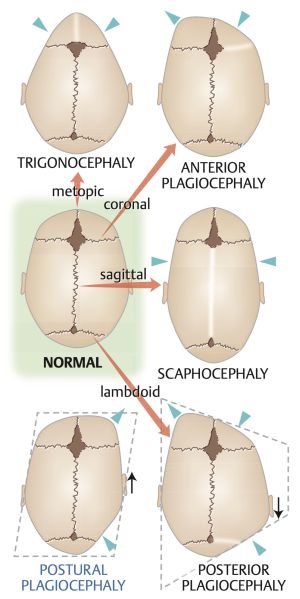Craniosynostosis: Difference between revisions
Jump to navigation
Jump to search
| Line 69: | Line 69: | ||
<track default="" kind="captions" label="English" src="https://www.fmichael1.com/moodle/local/VOD_gal/media/youmans8e/VOLUME_2/SECTION_8_Pediatrics/PART_3_Craniosynostosis/Video_220-1_Syndromic_Craniosynostosis.vtt" srclang="en" /> | <track default="" kind="captions" label="English" src="https://www.fmichael1.com/moodle/local/VOD_gal/media/youmans8e/VOLUME_2/SECTION_8_Pediatrics/PART_3_Craniosynostosis/Video_220-1_Syndromic_Craniosynostosis.vtt" srclang="en" /> | ||
</video></center> | </video></center> | ||
<script src="https://cdn.plyr.io/3.6.8/plyr.js"></script> | |||
<link rel="stylesheet" href="https://cdn.plyr.io/3.6.8/plyr.css" /> | |||
<script> | <script> | ||
const player = new Plyr('#player', { | const player = new Plyr('#player', { | ||
Revision as of 14:29, 3 February 2024
Types of craniosynostosis
Nonsyndromic Craniosynostosis
Single suture craniosynostosis
Pathology
- Bone growth primarily perpendicular to & occurring at suture lines; premature fusion → abnormal growth
Classification of single suture craniosynostosis

Syndromic craniosynostosis
Selected craniofacial dysmorphic syndromes
| Syndrome | Sporadic | Inherited | Craniofacial findings | Associated findings |
|---|---|---|---|---|
| Crouzon Syndrome (craniofacial dysostosis) | Yes (25%) | FGFR2 (AD) | Craniosynostosis of coronal & basal skull sutures, maxillary hypoplasia, shallow orbits, proptosis | HCP rare |
| Apert Syndrome (acrocephalosyndactyly) (MC) | Yes (95%) | FGFR2 (AD) | same as Crouzon | Syndactyly of digits 2, 3, 4; shortened UE, HCP common |
| Kleeblattschädel Syndrome | Yes | AD | Craniosynostosis /w trilobular skull | isolated, or with Apert's or thanatophoric dwarfism |
Youmans Video - Video 220-1 Syndromic Craniosynostosis